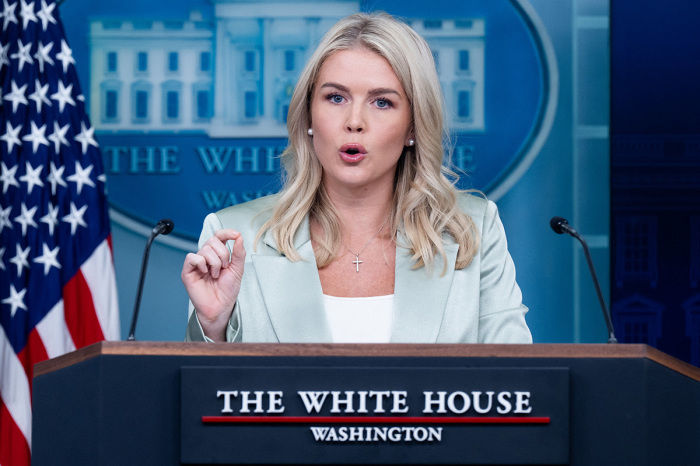
WASHINGTON — White House press secretary Karoline Leavitt pushed back Tuesday against critics who would assert that President Donald Trump’s initiative urging weekly group prayer for the United States is an example of Christian nationalism.
Trump introduced the White House’s America Prays initiative during his hour-long address at the second hearing of the White House Religious Liberty Commission, which was held Monday at the Museum of the Bible in the nation’s capital.
The initiative calls for Americans of faith to unite in prayer in groups of “at least 10 people to meet each week for one hour to pray” for the nation as it approaches the 250th anniversary of its independence in 2026.
Responding to a question during Tuesday’s press briefing at the White House, Leavitt dismissed concerns that Trump is unfairly promoting Christianity with his prayer initiative, noting that many non-Christian Americans also pray and that the president is exhorting prayer from all faith communities.
.@PressSec: It’s people of all faiths who pray, and that’s what @POTUS wants to protect… that’s why he was very proud and excited to announce this new initiative, ‘America Prays,’ encouraging all Americans to pray for our country leading up to America’s 250th birthday. pic.twitter.com/6A0haNJGyv
— Rapid Response 47 (@RapidResponse47) September 9, 2025
“Last time I checked, it’s not just Christians who pray,” she said. “It’s people of all faiths who pray, and that’s what the president wants to protect: the religious freedom for Americans of all faiths, and he spoke about that yesterday.”
“That’s why he was very proud and excited to announce this new initiative, encouraging all Americans to pray for our country and the goodness of our country leading up to America’s 250th birthday next year.”
Leavitt also touched on Trump’s announcement at the religious liberty commission that the U.S. Department of Education is planning to implement guidance to protect prayer in public schools. She noted the administration is committed to implementing measures that “ensure that the religious liberties of America’s students and our youth are respected in public schools.”
Karoline Leavitt: No Public School Student Should ‘Face Consequences’ for Expressing Their Religious Views
Is the Trump administration looking for the forthcoming prayer guidelines to challenge existing court precedent on the right to pray in public schools, asked Daily Signal… pic.twitter.com/GJpd6j5K9e
— The Daily Signal (@DailySignal) September 9, 2025
Leavitt noted how Trump highlighted the story of Shea Encinas, a 12-year-old Christian boy whose family took legal action after he was forced to read a book about gender ideology to a kindergartner when he was in fifth grade, which Leavitt asserted was in violation of “biological and biblical truth.”
“Americans of faith should not be facing consequences for expressing their religious freedom and their religious views,” Leavitt said. “Not in any public school in America should that be happening.”
Trump invited Encinas to take over his presidential podium at his Monday speech, during which the boy said of his situation: “It hurt a lot, but I kept trusting God.”
12-year-old boy who fought back against his school for pushing a book about changing genders speaks alongside President Trump at the Museum of the Bible:
“I’ve been a Christian my whole life, and Jesus means everything to me.”
“I knew this was not right, but I was afraid of… pic.twitter.com/XOjoAbv4wA
— Fox News (@FoxNews) September 8, 2025
Trump fielded criticism Monday for his prayer initiative from outlets such as The Washington Post, which described it as “a blurring of church-state lines” while noting the religious quotations in the White House’s 22-page prayer guidance are exclusively from the Old and New Testaments.
Organizations participating in the initiative include the Southern Baptist Convention, Samaritan’s Purse, Intercessors for America, First Baptist Church in Dallas, National Religious Broadcasters and multiple Roman Catholic groups.
Trump, whose rhetoric has become increasingly religious since he was nearly assassinated during a campaign rally last year in Butler, Pennsylvania, made headlines last month for comments he made regarding his own desire to go to Heaven.
After noting during an Aug. 19 interview that he hopes securing a ceasefire between Ukraine and Russia might play a role in his eternal destination, Trump sparked a theological debate among some of his Christian supporters regarding the role of faith and good works in salvation.
Jon Brown is a reporter for The Christian Post. Send news tips to jon.brown@christianpost.com
















